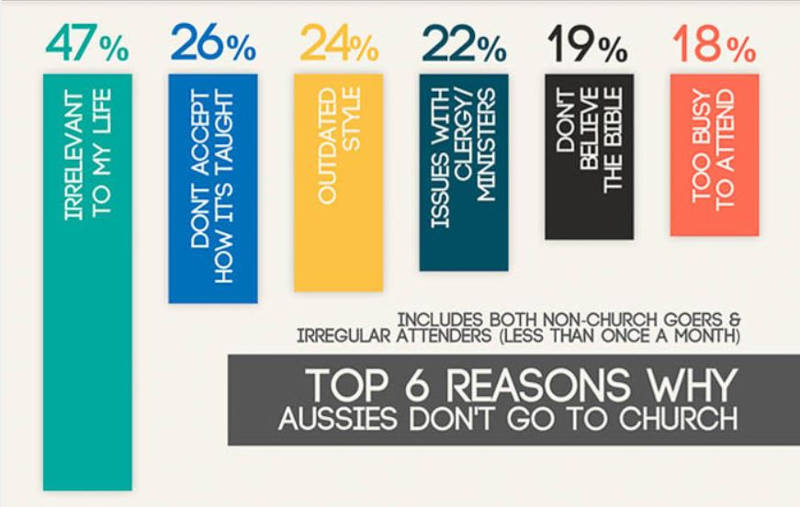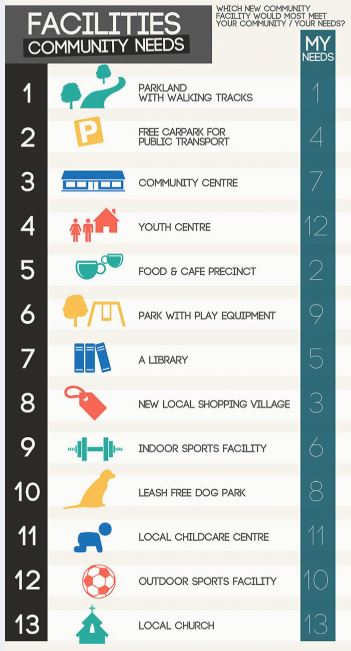- by Carrie Shaw
- on September 17, 2025
Despite Christianity still being Australia’s largest religion (61.1% compared with 7.3% of all other religions combined), the proportion of Australians identifying as Christian has been steadily declining over the past century. Compared to 1911, when 96% of people identified as Christian, the 2001 census recorded the figure of 68% and the latest Census, taken in 2011, recorded a drop to 61.1%.
New figures released in 2017 show that some 7 million Australians (30.1% of the population), said they did not identify with any religion at all, a figure that’s up from around 4.8 million (22.3%) in 2011’s Census.
The average church attender’s age has increased to 53 years and while the 70+ age group is still strongly represented, the younger generation is increasingly underrepresented. For example, 20-39 year olds make up about 34% of the national population but only 21% of church attenders.
Australia has more churches (13,000) than schools (9,500) yet church attendance has also declined. Those attending at least once per month has dropped by more than half when compared to statistics taken in 1972 (from 36% to the current attendance rate of 15%). Less than one in seven of the Australians who ticked “Christianity” on their census form regularly attend a church.
Six Top Reasons Why People Don’t Go To Church
For many people (as much as 47%), church is considered to be irrelevant to their life. The following diagram shows the top six reasons why Aussies aren’t going to church. This is a survey of both non-church goers and irregular attenders but these reasons are perhaps also relevant for those once-regular attendees who have dropped off.

Is Church-Going Still Relevant In 2019?
Nearly 50% of Australians believe the answer is ‘no’. It’s interesting to note in the following diagram that out of a list of 13 facilities and services that people agree a community needs, a local church comes in at 13 and 9 respectively (only scrapping ahead of English classes and migrant support, in the case of the latter). Clearly, for many people, church-going is not only personally irrelevant, it’s also considered practically superfluous to a community’s needs.

Church-going has become less relevant for Christians and non-Christians alike. Considerations such as meaningful engagement, purposeful worship, approachable ministry or authentic beliefs are all issues for people questioning the relevance of church and church attendance in their life.
Does Church-Going Make Me A Better Person?
It depends.
Similar to the colloquial, often humorous question “how long is a piece of string?”, the answer is; it depends. It depends on how you measure it.
Church-going, in and of itself, doesn’t make a someone a better person (or Christian, for that matter). No-one would suggest that hanging out in the local soccer club means you’ll become a better soccer player. Or that spending time every week in a car sales yard will make you a better driver. Attendance at church, in itself, really means nothing at all.
And, in fact, it could be argued that if you are attending because of the wrong motivations, then church-going could actually be detrimental for you. Going to church, just to keep your spouse or family happy, because you feel guilty if you don’t, or because you feel a sense of religious obligation, are never meaningful reasons to attend. Religious obligation – a ‘works-based’ mindset – is often one of the major causes of church burnout.
But when the purpose of church and church-going are both considered, we can measure the outcomes in a different way and get quite a different answer.
Church Is About People
The Greek word ekklesia, which has been translated as ‘church’ in our English Bibles, is found 114 times in the New Testament (the original word is actually translated assembly three times, church 74 times, churches 35 times, and congregation twice). The original definition is of an assembly of people convened at a public place, often for the purpose of deliberating.
The root meaning of church is not that of a building, but of people and it was used by the New Testament writers to describe the community of believers gathering together. These believers would meet in various places, such as homes (Romans 16:5) or the temple (Acts 2:42). It wouldn’t be incorrect to express their meetings in this way; that the early believers ‘churched together’ (or assembled together).
The word church, in time, also came to be used to describe the building in which Christian believers would meet and so ‘church’ is now understood to be either the people, the building or both.
Yet the biblical definition of ‘church’ is actually about the people – those who have placed their faith in Jesus Christ for salvation (John 3:16; 1 Corinthians 12:13). These people are the community of believers who gather together and the Apostle Paul describes it like the human body, a living thing – made up of real people (1 Corinthians 12:12). In fact, he devoted a whole chapter in the book of Corinthians (in the New Testament) to the principles and purpose of ‘church’ and how each ‘member’ is to be valued for the diversity and contribution they bring to ‘the body’. In essence, church is about relationship.
“Church is not an event you go to. It’s a family you belong to.” – Rick Warren
What Is The Purpose Of Church?
The purpose of church (believers getting together) can be briefly summarised as follows:
- To honour God and His Son – ‘worship’
- To grow community – ‘fellowship’
- To develop personally – ‘discipleship’
- To provide service to others – ‘ministry’
- To share the Good News – ‘evangelism’
These purposes are all outworked in the context of relationship – with God, His son and with each other. Church-going is about ‘giving’ and ‘getting’. Church life is designed to enrich our lives, ease our burdens, and provide supportive relationships for hard times. It develops character growth and maturity so that we can support others, when needed. Service within a church should be something that fills a person with joy and deep personal fulfillment – the natural outworking of a life based on being a certain kind of person, not doing certain kinds of things. Church life – life with Jesus – is for those who are weary and burdened – because in Jesus we find rest.
“Come to me, all you who are weary and burdened, and I will give you rest. Take my yoke upon you and learn from Me; for I am gentle and humble in heart, and you will find rest for your souls.…” – Jesus, Matthew 11:28-29
Church-going provides opportunity to undertake all the purposes that a community of believers consider to be important aspects of their Christian life.
So if we ask the question again – does church-going make me a better person? – the answer is yes – depending on how you measure it.
If going to church makes you feel like you have a place to belong, gives you support and encouragement, fosters a sense of individual growth and development ‘in Christ’, without judgment, and provides opportunity for you to extend God’s love to others, then yes, church-going can help you be a ‘better person’.
In this context, church-going is definitely still relevant and, it could be argued, essential for healthy, well functioning communities. Church – true church – helps people grow in the ways that matter most – in their relationship with God and Jesus and their relationship with others. This is the Bible’s definition of true happiness and a flourishing life.
“In the biblical sense, true human flourishing [happiness] and well-being can only be found in relationship with God and through alignment with His coming kingdom..it is important to see that this flourishing can never occur fully apart from a proper relationship with the creator God. All of the Bible’s vision of human flourishing both now and in the age to come either assumes or explicitly states this fact.” – Jonathan Pennington, PhD, A Biblical Theology Of Human Flourishing
Overcoming Negative Experiences Of Church
For many people, however, church is not the experience they hoped or thought it would be. Rigid expectations, subtle (or not so subtle) spiritual manipulation, a performance-driven culture or unhealthy theology all combine to ensure the experience of ‘church’ is one of failure, disconnect, disappointment and isolation, from both community and God. This is a sad but nonetheless true fact and the experience of many people.
God’s gift of freedom, found in His gospel of grace, is easily perverted and often squandered by men or women placing religious burdens and rituals on their fellow man. Jesus condemned the religious leaders of his day for exactly this, commenting that “they tie up heavy, burdensome loads and lay them on men’s shoulders, but they themselves are not willing to lift a finger to move them…” (Matthew 23:4).
God – and by extension, church – should not be an impersonal force to be used to make people behave in certain prescribed ways. God is a deeply real and loving Father who invites us into a personal relationship with Him and whose love and acceptance should be manifested by those who ‘church together’ in His name.
So, Is Church-Going Still Relevant?
“Christians need relationships to grow. We don’t grow in isolation; we develop in the context of fellowship” – Rick Warren
Communities also need relationships to flourish and grow, to provide stability and support, and to offer compassion and encouragement. Church can play an important part in people’s lives, both Christian or non-Christian, to facilitate these endeavours. Not only that, with the weight of life’s pressures and the uncertainty of life’s big questions bearing down on people, church is often the place people will turn to ‘find God‘.
Church is (or should be) the place where the Good News of God’s salvation is joyfully lived and unconditionally offered – a place of support and fellowship for those who believe and a place of welcome and hope for those who don’t. Discovering that God has a plan and purpose for you – if you want it – is the most empowering, life-changing realisation in the world!
“God’s way is not a matter of mere talk; it’s an empowered life.” -1 Corinthians 4:20
God’s love is demonstrated to the world through a Christian’s application of it to others (John 13:35), and this love in operation becomes concrete evidence of the power of God’s message, as given through Jesus, to transform lives. ‘Church’ (a community of believers gathering together) provides a powerful opportunity to do that, and benefits believers and non-believers alike.
“If it isn’t good news, it isn’t the Gospel. The Gospel is about what God has done for us and what we can become in Christ; it’s about Christ being the answer to our deepest needs. The Good News offers lost people what they are frantically searching for: forgiveness, freedom, security, purpose, love, acceptance and strength. It settles our past, assures our future, and gives meaning to today. It is the best news in the world.” – Rick Warren, A Purpose Driven Church






